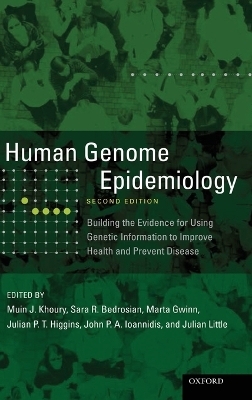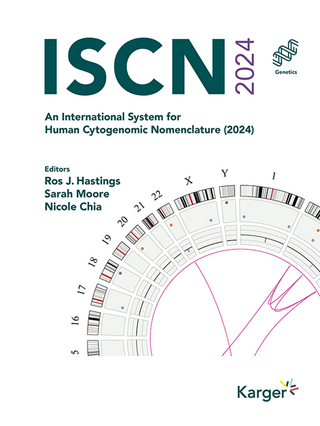
Human Genome Epidemiology,
Oxford University Press Inc (Verlag)
978-0-19-539844-1 (ISBN)
With contributions from leaders in the field from around the world, this new edition is a fully updated look at the ways in which genetic factors in common diseases are studied. Methodologic developments in collection, analysis and synthesis of data, as well as issues surrounding specific applications of human genomic information for medicine and public health are all discussed. In addition, the book focuses on practical applications of human genome variation in clinical practice and disease prevention. Students, clinicians, public health professionals and policy makers will find the book a useful tool for understanding the rapidly evolving methods of the discovery and use of genetic information in medicine and public health in the 21st century.
Muin J. Khoury, MD, PhD, is Director of the Office of Public Health Genomics at the Centers for Disease Control and Prevention. He is an Adjunct Professor of Epidemiology at the Rollins School of Public Health at Emory University and an Associate in the Department of Epidemiology at Johns Hopkins Bloomberg School of Public Health. Sara R. Bedrosian is a health communications specialist for the Office of Public Health Genomics at the Centers for Disease Control and Prevention in Atlanta, Georgia. Marta Gwinn, MD, MPH, is a medical epidemiologist for the Office of Public Health Genomics at the Centers for Disease Control and Prevention. She currently leads OPHG's Knowledge Integration effort, which promotes using the tools of human genome epidemiology to translate genomic research results into information for clinical and public health applications. Julian P. T. Higgins, PhD, is a Senior Statistician at the MRC Biostatistics Unit at the Institute of Public Health in Cambridge, United Kingdom. He headed the UK HuGENet Coordinating Centre in Cambridge from its inception, and is a major contributor to The Cochrane Collaboration. John P. A. Ioannidis, MD, PhD, is Professor and Chairman of the Department of Hygiene and Epidemiology at the University of Ioannina School of Medicine in Ioannina, Greece and a collaborating scientist at the Biomedical Research Institute, Foundation for Research and Technology - Hellas. Julian Little, MA, PhD, holds the Canada Research Chair in Human Genome Epidemiology, and is a Professor and Chair of the Department of Epidemiology and Community Medicine at the University of Ottawa in Canada.
PART I: Fundamentals of human genome epidemiology revisited
1. Human genome epidemiology: The road map revisited
Muin J. Khoury, Sara R. Bedrosian, Marta L. Gwinn, Julian P. T. Higgins, John P. A. Ioannidis, and Julian Little
2. Principles of analysis of germline genetics
Jesus Gonzalez-Bosquet and Stephen Chanock
3. The public health genomics enterprise
Philippa Brice and Ron Zimmern
4. Navigating the evolving knowledge of human genetic variation in health and disease
Marta L. Gwinn and Wei Yu
PART II: Methods and approaches for data collection, analysis and integration
5. The global emergence of epidemiological biobanks: Opportunities and challenges
Paul Burton, Isabel Fortier, and Bartha Knoppers
6. Case-control and cohort studies in the age of genome-wide associations
Teri Manolio
7. The emergence of networks in human genome epidemiology: Challenges and opportunities
Daniela Seminara, Muin J. Khoury, Thomas R. O'Brien, Teri Manolio, Marta L. Gwinn, Julian Little, Julian P. T. Higgins, Jonine L. Bernstein, Paolo Boffetta, Melissa Bondy, Molly S. Bray, Paul E. Brenchley, Patricia A. Buf?er, Juan Pablo Casas, Anand P. Chokkalingam, John Danesh, George Davey Smith, Siobhan Dolan, Ross Duncan, Nelleke A. Gruis, Mia Hashibe, David Hunter, Marjo-Riitta Jarvelin, Beatrice Malmer, Demetrius M. Maraganore, Julia A. Newton-Bishop, Elio Riboli, Georgia Salanti,
Emanuela Taioli, Nic Timpson, André G. Uitterlinden, Paolo Vineis, Nick Wareham, Deborah M. Winn, Ron Zimmern, and John P. A. Ioannidis
8. Design and analysis issues in genome-wide association studies
Duncan Thomas
9. The challenge of assessing complex gene-gene and gene-environment interactions
Peter Kraft and David Hunter
10. STrengthening the REporting of Genetic Association Studies (STREGA) - An extension of the STROBE statement
Julian Little, Julian P.T. Higgins, John P.A. Ioannidis, David Moher, France Gagnon, Erik von Elm, Muin J. Khoury, Barbara Cohen, George Davey-Smith, Jeremy Grimshaw, Paul Scheet, Marta Gwinn, Robin E. Williamson, Guang Yong Zou, Kim Hutchings, Candice Y. Johnson, Valerie Tait, Miriam Wiens, Jean Golding, Cornelia van Duijn, John McLaughlin, Andrew Paterson, George Wells, Isabel Fortier, Matthew Freedman, Maja Zecevic, Richard King, Claire Infante-Rivard, Alex Stewart, and Nick Birkett
11. Integration of the evidence on gene-disease associations: Methods of HuGE reviews
Julian P.T. Higgins and Julian Little
12. Genome-wide association studies, field synopses and the development of the knowledge base on genetic variation and human disease
Muin J. Khoury, Lars Bertram, Paolo Boffetta, Adam S.Butterworth, Stephen J. Chanock, Siobhan M. Dolan, Isabel Fortier, Montserrat Garcia-Closas, Marta L. Gwinn, Julian P. T. Higgins, A. Cecile J.W. Janssens, James Ostell, Ryan P. Owen, Roberta A. Pagon, Timothy R. Rebbeck, Nathaniel Rothman, Jonine L. Bernstein , Paul R. Burton, Harry Campbell, Anand P. Chokkalingam, Helena Furberg, Julian Little, Thomas R. O'Brien, Daniela Seminara, Paolo Vineis, Deborah M. Winn, Wei Yu, and John P.A.
Ioannidis
PART III: Case studies: Cumulative assessment of the role of human genome variation in specific diseases
13. Colorectal cancer
Harry Campbell, Steven Hawken, Evropi Theodoratou, Alex Demarsh, Kimberley Hutchings, Candice Y. Johnson, Lindsey Masson, Linda Sharp, Valerie Tait, Julian Little
14. Childhood leukemias
Anand P. Chokkalingam and Patricia A. Buffler
15. Bladder cancer
Jonine D. Figueroa, Montserrat Garcia-Closas, and Nathanial Rothman
16. Type 2 diabetes
Mark McCarthy and Eleftheria Zeggini
17. Osteoporosis
André G. Uitterlinden, Joyce B.J. van Meurs, and Fernando Rivadeneira
18. Preterm birth
Siobhan M. Dolan
19. Coronary heart disease
Adam S. Butterworth, Julian P.T. Higgins, Nadeem Sarwar, and John Danesh
20. Schizophrenia
Lars Bertram
PART IV: Applications of epidemiologic methods for using genetic information in medicine and public health
21. Mendelian randomization: The contribution to genetic epidemiology to elucidating environmentally modifiable causes of disease
George Davey-Smith and Shah Ebrahim
22. Evaluation of predictive genetic tests for common diseases: Bridging epidemiological, clinical and public health measures
A. Cecile J. W. Janssens, Marta Gwinn, and Muin J. Khoury
23. The Evaluation of Genomic Applications in Practice and Prevention (EGAPP) initiative: Methods of the EGAPP working group
Steven M. Teutsch, Linda A. Bradley, Glenn E. Palomaki, James E. Haddow, Margaret Piper, Ned Calonge, W. David Dotson, Michael P. Douglas, and Alfred O. Berg
24. Rapid evidence-based reviews of genetic tests
Jim M. Gudgeon, Glenn E. Palomaki, and Marc S. Williams
25. Role of social and behavioral research in assessing the utility of genetic information
Saskia C. Sanderson , Christopher Wade, and Colleen M. McBride
26. Assessing the evidence for clinical utility in newborn screening
Scott Grosse
27. The role of epidemiology in assessing the potential clinical impact of pharmacogenomics
David L. Veenstra
28. The human epigenome and cancer
Mukesh Verma
29. The use of family history in public health practice: the epidemiologic view
Rodolfo Valdez, Muin J. Khoury, and Paula W. Yoon
PART V: Case studies: Assessing the use of genetic information in practice for specific diseases
30. Cytochrome P450 testing in the treatment of depression
Iris Grossman, Mugdha Thakur, and David B. Matchar
31. A rapid ACCE review of CYP2C9 and VKORC1 allele testing to inform warfarin dosing in adults at elevated risk for thrombotic events to avoid serious bleeding
Monica R. McClain , Glenn E. Palomaki, Margaret Piper, and James E. Haddow
32. Hereditary hemochromatosis: Population screening for gene mutations
Diana B. Petitti
| Erscheint lt. Verlag | 4.2.2010 |
|---|---|
| Verlagsort | New York |
| Sprache | englisch |
| Maße | 234 x 165 mm |
| Gewicht | 1103 g |
| Themenwelt | Studium ► 2. Studienabschnitt (Klinik) ► Humangenetik |
| Studium ► Querschnittsbereiche ► Prävention / Gesundheitsförderung | |
| ISBN-10 | 0-19-539844-0 / 0195398440 |
| ISBN-13 | 978-0-19-539844-1 / 9780195398441 |
| Zustand | Neuware |
| Informationen gemäß Produktsicherheitsverordnung (GPSR) | |
| Haben Sie eine Frage zum Produkt? |
aus dem Bereich


